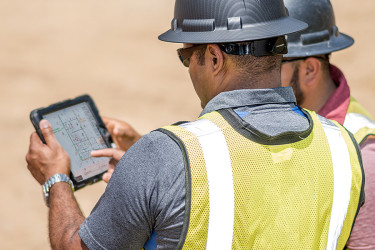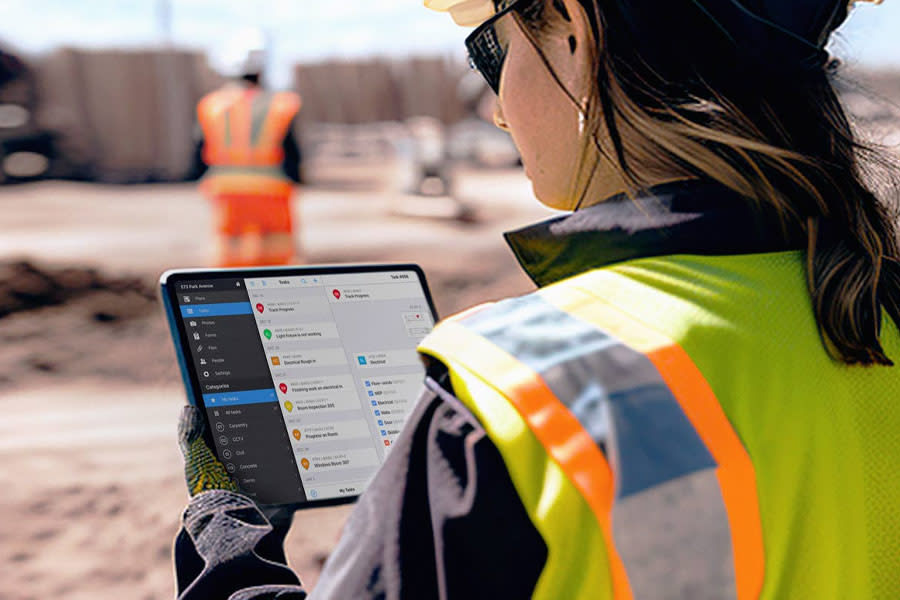These 5 essential traits in your team are the secret to a successful construction project

There’s more to a successful construction project than enough resources, workforce and budget. It demands a team equipped with specific traits. As a subcontractor, you play a crucial role in the success of a construction project, making it essential for you to embody and instill these characteristics in your crew. Discover five vital traits that can help improve collaborations and elevate your business.
1. Trust
Trust is the foundation of every successful project. It affects the safety, efficiency and quality of the work, and the overall satisfaction of the general contractor and project owner. In the report “Trust Matters: The High Cost of Low Trust,” more than 2,500 industry professionals globally and found that the cost of trust in construction — internally and externally — generates more employee engagement, value collaboration and build stronger relationships.
Most importantly, it’s the secret ingredient to teamwork. Without trust, you can’t expect the other person to do their job efficiently. When trust is non-existent, people will lack the motivation to do their best work on the project.
The challenge for subcontractors like you is building trust with your team and other people involved in the project. Here are some things you can do to reinforce it:
- Communicate frequently: As a leader, it’s important to have project goals and expectations. You must be vocal about your team's targets, feedback and progress.
- Delegate tasks: Giving your team the responsibility to do their duties effectively is a way of showing your trust. If you micromanage or second-guess a teammate’s work, it may create feelings of doubt.
- Build relationships: Trust also stems from good connections and mutual understanding. You need to show care to your team members, the general contractor and project timelines. Offer your help and support to the challenges anyone on the project is facing.
- Be accountable: Mistakes are inevitable in construction projects. If left unaddressed, even something minor can damage trust among your crew, the project team and the executive team. Be accountable for your shortcomings and act on them quickly.
- Resolve conflicts calmly: Like mistakes, disputes may arise at times. You should address them calmly and respectfully. Don’t take sides or blame one person. Instead, channel your energy into finding a solution.
2. Mutual respect
Respecting another person includes acknowledging their talents and abilities, and not discriminating against them because of their race or social background. Respect isn’t earned because of rank or age but is given equally to everyone involved in the construction project.
Take Jim Fowler — the CEO of NOVO Construction — as an example. He collaborates with organizations supporting diversity, equity and inclusion, and champions inclusive hiring in his team so all people have a seat at the table. NOVO Construction also launched a mentorship initiative to ensure their underrepresented staff gets the assistance they need to advance their careers.
Showing mutual respect also means people are ready to speak out whenever necessary. Even when you disagree with someone’s point of view, you’re prepared to listen and present your opinions respectfully.
The absence of mutual respect among team members can result in poor communication and lack of cooperation. People won’t be able to resolve issues amicably, which can lead to delays and even compromise the structure's success. If people feel disrespected, they may leave a project, which can delay it and disrupt its continuity.
3. Planning
Trust is essential, but without a clear plan, it’s like having a blueprint but no instructions. Planning means setting goals to make sure the team moves in the same direction.
A construction project’s aim should be measurable and well-defined. The SMART framework is a great way to organize your targets. Without goals and objectives, you won’t truly know if you’ve succeeded. The acronym refers to the following:
- Specific: Be clear about the project goals. Who is involved? What are the limitations of the work? What are the tasks?
- Measurable: Set metrics to measure when the team reaches a target. This may be a number, a measurement of time, a percentage or an amount of money.
- Achievable: Are your goals realistic and achievable, given the resources, employees, knowledge and time available?
- Relevant: Identify the “why” of an idea — its benefits to the construction project, the project owner and the general contractor. Why does it matter to the task? Will it help make the processes efficient?
- Time-Bound: Give your aims a time frame. Setting a due date gives everyone clarity about what to do and when to do it.
Without proper planning, there may be an increased risk of delays. Stalls can add up and impact the final deadline if you or the general contractor underestimate the time for your project. If a goal needs clarification, communicate with the general contractor about it. Once you have the details, assess how to maximize your crew to achieve the objectives better.
In the case of complex construction projects, proper planning involves incorporating technology. For instance, international industrial corporation Georg Fischer partnered with XYZ Reality to create their concept using augmented reality that shows the final look and specifications of the project, giving the team confidence that work will be done on time.
4. Desire to help others
When team members support one another, it promotes a positive work atmosphere. In fact, helpfulness in the workplace translates into greater well-being and satisfaction.
In the construction industry, you can only achieve so much alone. You have to rely on your teammates when times are tough and you should also make them feel they can rely on you.
The desire to help others extends beyond the project. A team willing to extend a helping hand is more likely to consider the more significant impact of their work, which is why they also engage with local communities. Look at how Medley Equipment Company trained people to operate forklifts for free — the company did this to improve employability opportunities for locals, leading to self-sufficiency.
When the team gets involved in fundraising, volunteering and other activities, you make yourself more visible in the community. The more active you become, the more you can help ease people’s concerns when finishing a construction project.
Lack of mutual support within the team may result in poor group dynamics. Instead of operating as a team, people may work in silos. They are also less likely to engage in brainstorming and initiatives, which can result in missed opportunities to enhance the project and support a community.
5. Effective project management
Successful subcontracting relies on effective project management. When there’s a clear allocation of resources and the distribution of tasks within the given timeline, it makes it easier for people to get the job done.
This is where project management comes in — it gives everyone an overview of the project aspects, ensuring that stakeholders are aligned, all activities are within the given budget and the project is delivered on time while maintaining quality standards. When there’s no effective project management, the project may exceed the initial estimates, cause delays and the project scope may expand beyond the initial plan without proper control.
With 77% of megaprojects globally often falling behind schedule, investing in construction project management software is practical. It helps streamline project specifications and progress. As a subcontractor, this tool can help you finish your projects on time, which may lead to more projects and the expansion of your business. Key features include:
- Scheduling: This allows managers to assign manpower and resources to the project.
- Tracking: Using this feature helps you keep track of tasks and progress throughout the project. Dean Snyder Construction’s Director of Project Management, Michael Huff, shared that the company uses project management software to build forms that drive awareness of project updates and progress.
- Job costing: This allows team members to compare the initial budget with actual project costs, as well as send purchase and exchange orders.
- Document management: Project documents such as contracts, blueprints and photos are easily accessible in a construction project management software.
Exercise these traits today
Embracing these traits isn’t only the key to a successful construction project. They’re also your ticket to exciting new projects. Keep these characteristics in mind and share them with your crew to pave the way for greater efficiency and future construction achievements.

 Rose Morrison •
Rose Morrison • 


















